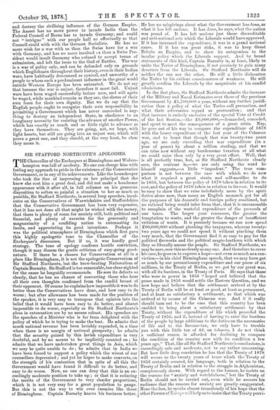TOPICS OF THE DAY.
THE JUSTICE OF THIS WAR.
IT is time, as the Ameer will not yield, and British armies are gathering fast, to ask wherein consists the justice of this invasion of Afghanistan ? We have hitherto avoided that question, partly, we fear, from a certain hopelessness, and partly because the argument from expediency alone has seemed to us so unanswerable ; but it is time to ask it now, and ask it seriously. What have the Afghans or their Ameer done to us or to mankind, that Great Britain, armed as she is with the irresistible strength of civilisation, should invade Afghanistan in cold blood, and after months of reflection slaughter the people and depose or subjugate the Prince ? The majority of our opponents reply that the Afghans, through their Government, have placed themselves voluntarily in a position which makes them instruments in the hands of Russia in designs directed against the British Empire in India ; but we must, to begin with, utterly repudiate that reply. If it is false, it has no force, and if it is true, it imputes to the British Government and people a baseness for which there is no precedent in their history. Because a great Power threatens us, or is supposed to threaten us, therefore we are to destroy a little one. Because Russians are hostile and dangerous, therefore we are to spare Russians, and kill Afghans. Because an arch-tempter at St. Petersburg is intriguing with a petty chief of the Mountains, therefore, while most friendly to the tempter—making, indeed, secret arrangements with him— we are to destroy the chief whom he has tempted. The master, we say, is egging on the little boy to throw stones, and therefore we will bow civilly to the master and break the little boy's arm. There is something so utterly mean in such a defence, so entirely at variance with English notions of fair-play, that we decline to accept it as serious, and are forced to regard it as a mere pretence, put forward by men who otherwise would regard a mountain tribe as almost un- worthy foes. If Russia is warring against us, let us accept war, and do our best to endure and overcome the calamity ; but to punish Russia's victim or agent is to shoot a sentry be- cause he is standing on guard. The offence must lie with the Ameer, whom, it would seem, we are about in November or April utterly to reduce, by invading his country with 50,000 men, and capturing his capital,—and what has the Ameer done ? He has shown himself, it is said, unfriendly to Great Britain, having received the Envoy of a Power with which we have just signed a Treaty that, by the affirmation of its authors, secures us "peace, with honour," but having declined to receive ours. Well, why should not the Ameer be unfriendly ? What have we done for him, that he should lose the ordinary right of every Government to make what alliances he pleases, and what friendships he can Unfriendliness is no ground for punish- ment. He has never invaded us, or threatened us, or block- aded us, or done anything to us, except say that he wanted to see and hear as little of us as possibly might be. He has " cut" us, that is all, and is, therefore, to be subjected to an aggravated assault. But he has been friendly to Russia? So are a dozen Powers whom we never dream of attacking ; so, for example, is Sweden, who could, by ceding Hammerfest, plant a Russian fleet upon the ocean opposite our own coast, and so, in Jingo judgment, revolutionise the world. Why not invade Sweden I But we are told the Ameer has insulted us, and as he is an Asiatic Prince with dominions bordering upon India, we cannot brook that such insolence should pass unpunished. But where is the insult ? The Ameer, like his father, Dost Mahommed, has steadily refused to receive a Mission at Cabul, and we have till now as steadily continued to pass over his refusal. How is he to understand that con- duct which from 1852 has been regularly condoned—so com- pletely condoned, that we sent him costly presents and a subsidy, in proof of friendship—must to-day be considered an affront, to be punished by invasion ? It is true he has on this occasion compelled a British Mission to return, but what else could he do ? He has always refused to receive it, he had granted no new permission, and to receive it when coming in defiance of his remonstrance would have been to pro- claim himself, in sight of his subjects, a conquered man. He is not bound to receive a Mission, and especially such a Mission, unless he likes, any more than we are bound to re- ceive a Mission from the Pope or from Mexico. His final letter, it is again alleged, is most discourteous,—indeed, he tells us " to do our worst, and he will leave the issue to God." Is that a discourtesy ? Is it not almost precisely the formula in which all Europeans, when exasperated, declare their final refusal to accept the terms offered, and their conviction that those terms are unendurably unjust ? We have provoked the Ameer beyond bearing. We have seized a fortress which opens the road directly into his province of Candahar. We have sent him letters which we will not stigmatise as dis- courteous, only because we do not know what terms the trans- lator may have employed. We have, in defiance of his direct prohibition, sent a Mission over his frontier, and we have pro- claimed to the whole world, in Europe and in Asia, in unmis- takable language, that he must become our vassal. Surely, in any human mouth, a clear defiance, under such circum- stances, is neither unbecoming nor insolent, unless, indeed, it be insolence for a little Power—say, Holland—ever to defy to battle a great Power,—say, Spain. But it was a chal- lenge ? Possibly, though it was rather the challenge of despair than of pride ; but why do Englishmen, of all people in the world, think it morally wrong to decline to accept challenges They are not afraid, we presume, of being taunted with want of courage, or strength, or energy. Sup- pose the King of Dahomey beats all his war-drums, and taunts all Englishmen as cowardly barbarians for not resenting that insult, are we, therefore, to waste lives upon a march to Abomey ? The argument is almost too absurd, as absurd as would be a law that every gentleman abused by a cabman or slanged by a bargee was bound there and then to take off his coat and challenge him to fisticuffs. Or rather, it is not absurd, but horrible, as horrible as is to English ears the traditional etiquette which, in some Continental armies, forces an officer, if insulted even by a drunken man, to slay him there and then upon the pavement. There has been no insult, but only a defiance, and to invade Afghanistan, to kill its people, to upset its throne, to reduce it either to anarchy or subjection, because its ruler has stated, in strong language, that he pre- fers invasion to vassalage, is radically and utterly unjust. We have the more right to say this, because we are not mealy-mouthed either about war or conquest. War is often right, and conquest often essential to the progress of the world. If Shere Ali were the head of a dominant caste whose ascendancy kept millions of European Christians in misery and hopelessness, we should consider his deposition, if it could be effected without risking the disturbance of the whole world, not only excusable, but a duty. If his dominions were within the Peninsula, and himself an Indian Prince, we should say that his example so endangered the quiet and good government of a population fifty times his own, that he must be coerced by force into a more submissive attitude, or even removed from his throne, as a measure of high State police. But the Afghans oppress no one but each other. They have their own govern- ment in their own hands, and can abolish the Ameership if they please. Thoir country is in no worse condition than it has ever been ; indeed, is in a better one, for Shere Ali, in forming a regular army, has provided means for restraining his nobles, and is doing unconsciously pre- cisely the work of a Philip Augustus or Louis XI. Nobody is even proposing to invade Afghanistan in order to liberate or improve its people. On the contrary, the order to invade is given by a Government which deliberately declared British interests to be above morality, which retained an Ambassador who wrote publicly that when high policy is con- cerned a massacre more or less made no difference in our obli- gation to protect those who committed it, and which obeys a Premier who jeered at stories of atrocities because Asiatics had quicker methods of satisfying revenge. Afghanistan is in no way specially a subject of pity, while as to the Ameer, so far from interfering with our rule in India, his one persistent anxiety has been to have nothing to do with us, not even negotiation or the interchange of courtesies. He treats us as we treat the Pope, and will have none of our Nuncio, though like ourselves in the same position, he admits informal embassies, and allows our Envoy, if only an Asiatic, every con- sideration. Neville Chamberlain is repulsed, as persona non grata, but Gholam Hussein Khan is welcomed, and under most exciting circumstances guarded from all foes.
Let us make no mistake about the facts. This war is unjust, and can be defended, if defended at all, only upon considerations of expediency which would justify any war against a weak Power, because a strong Power by seizing it might possibly become a little stronger. Prince Bismarck would be fully justified by our arguments in invading and garrisoning Switzerland, because through Switzerland a French army might, in the fullness of time, enter South Germany,
and destroy the civilising influence of the German Empire. The Ameer has no more power to invade India than the Federal Council of Berne has to invade Germany, and could not " intrigue" with our people half so effectually as that Council could with with the German Socialists. He has no more wish for a war with us than the Swiss have for a war with Germany, and has no more insulted es than a Swiss Pre- sident would insult Germany who refused to accept terms of submission, and left the issue to the God of Battles. The war is a war of policy only, and can be defended only on grounds which Englishmen throughout their history, even in their Indian wars, have habitually denounced as cynical, and unworthy of a people to whom such a predominant influence in the great world outside Western Europe has been entrusted. We do not say that because the war is unjust, therefore it must fail. Unjust wars have been waged successfully before now, and will again be waged, while mankind remain as they are, the slaves of their own fears for their own dignity. But we do say that the English people ought to recognise their own responsibility in permitting a Government which has never succeeded in any- thing to destroy an independent State, in obedience to an imaginary necessity for resisting the advance of another Power, which has exactly as much and as little right to advance as they have themselves. They are going, not, we hope, with light hearts, but still are going into an unjust war, which will prove a great one, and they should, at the very least, be clear they mean it.



































 Previous page
Previous page